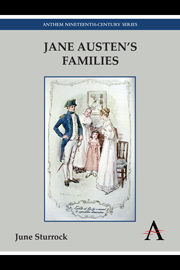Book contents
- Frontmatter
- Table of Contents
- Acknowledgements
- References and Abbreviations
- General Introduction
- Part I Family Dynamics
- Introduction
- Chapter One The Functions of the Dysfunctional Family: Northanger Abbey, Sense and Sensibility, Pride and Prejudice
- Chapter Two Spoilt Children: Pride and Prejudice, Mansfield Park and Emma
- Chapter Three “Usefulness and Exertion”: Mothers and Sisters in Sense and Sensibility, Mansfield Park, Emma and Persuasion
- Part II Fathers and Daughters
- Conclusion: “Creative Attention”
- Notes
- Select Bibliography
- Index
Introduction
from Part I - Family Dynamics
- Frontmatter
- Table of Contents
- Acknowledgements
- References and Abbreviations
- General Introduction
- Part I Family Dynamics
- Introduction
- Chapter One The Functions of the Dysfunctional Family: Northanger Abbey, Sense and Sensibility, Pride and Prejudice
- Chapter Two Spoilt Children: Pride and Prejudice, Mansfield Park and Emma
- Chapter Three “Usefulness and Exertion”: Mothers and Sisters in Sense and Sensibility, Mansfield Park, Emma and Persuasion
- Part II Fathers and Daughters
- Conclusion: “Creative Attention”
- Notes
- Select Bibliography
- Index
Summary
The parents in Miss Austen's novels are less like savage wild beasts than those of her predecessors, but she evidently looks upon them with suspicion, and an uneasy feeling that le père de famille est capable de tout makes itself sufficiently apparent throughout the greater part of her writings.
These words of Samuel Butler, writing in The Way of All Flesh, certainly exaggerate, for none of Austen's pères de famille approaches Butler's own Mr Pontifex in savagery. All the same, they are based on the perfectly accurate perception that Austen refuses to idealize her families. Parents and children alike have their own personal preoccupations, their strengths and weaknesses, as well as their responsibilities. The ideal is not readily combined with the particular and Austen is concerned as a novelist with the particular. Through particular actions and interactions – through the Eltons laughing together at Mr Elton's refusal to dance with Harriet or through Fanny Price uncomplainingly cutting roses under a midsummer sun – she establishes the moral world of her characters.
Austen's heroines develop partly because of and partly in spite of the faults and foibles of the families from which they emerge. Moral sense, after all, must involve some knowledge of and contact with evil. Unlike many of her successors and admirers, such as Henry James, Elizabeth Bowen, Iris Murdoch or Penelope Fitzgerald, Austen was not particularly interested in the question of innocence as such.
- Type
- Chapter
- Information
- Jane Austen's Families , pp. 11 - 14Publisher: Anthem PressPrint publication year: 2013



